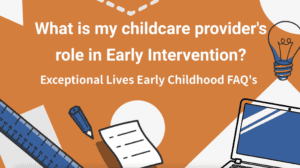Working with a child care provider that can meet your needs can be challenging. There is so much to consider when you decide to entrust another party to care for your little one. It is important to ask the right questions on how you can work together with your provider to make sure your child stays on track with meeting their milestones.
In this episode of our Early Childhood FAQ series, we talk about your child care provider’s role in early intervention. Early Intervention (EI) is a program that offers services to infants and toddlers (up to age 3) who need help with their development. Early Intervention is available in every state and U.S. territory. It is free to many families; and it may be called something different, like Early Steps, in your state.
It’s important that your provider is familiar with your child’s care plan and supports your goals to help them reach their milestones while they are in their care. Watch this short video to learn more about your child care provider’s role in Early Intervention and how they can support your child’s learning.
Learn more:
Early childhood development hub
Understanding child development milestones
Transcript:
Welcome back to the Exceptional Lives Early Childhood FAQ series. In this episode we will discuss your child care provider’s role in Early Intervention.
- If your child is in Early Intervention, you can invite your provider to be a part of the team that creates the care plan. Once the care plan is in place, they should read it and talk with you about how they can use it to support your child while in their care. Ask if they will allow your EI provider to occasionally come in and observe.
- Your provider should communicate regularly with you about your child’s progress and milestones. Emails, phone calls, or in person updates will help you track how your child is doing and what you can work on at home to set them up for success.
- Modify their day to support your child’s development. This could mean having alternative activities or rethinking a disciplinary action if it isn’t appropriate for your child based on their disability.
- Depending on if you are using a home daycare or a larger facility, your provider should make “reasonable accommodations” so that the physical space works for your child. A great example is grab bars for a toilet stall or installing an accessible swing on the playground.
Visit ada.gov to get more information on what accommodations your provider is required to provide.
If you’d like more information and services, visit our Early Childhood Development Hub on our website at www.exceptionallives.org.



